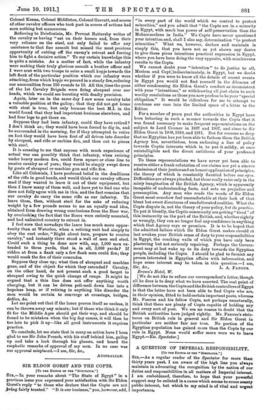SIR ELDON GORST AND THE COPTS.
[To THZ EDITOR OP VTR "SrEore.Tos."] SIB,—In your remarks about "The State of Egypt" in a previous issue you expressed your satisfaction with Sir Eldon Gorses reply "to those who declare that the Copts are not ,Pei,ng fairly treated." "It is our business," you, however, add,
"in every part of the world which we control to protect minorities," and you admit that "the Copts are in a minority in Egypt, with much less power of self-preservation than the Mohammedans in India." We Copts have never questioned your intention and, shall I also say, determination "to protect minorities." What we, however, declare and maintain is simply this, that you have not as yet shown any desire to give these pious intentions practical expression in Egypt, where you have been doing the very opposite, with mischievous results to the Copts.
We cannot doubt your " intention " to do justice to all, Moslem and Coptlindiscriminately, in Egypt, but we doubt whether if you were to know all the details of recent events in Egypt you would not find yourself in the dilemma of either condemning Sir Eldon Gorst's conduct as inconsistent with your "intentions," or withdrawing all just claim to such worthy resolutions as those you now profess to be your "special obligation." It would be ridiculous for me to attempt to condense our case into the limited space of a letter to the Editor.
For a number of years past the authorities in Egypt have been behaving in such a manner towards the Copts that it was found necessary to make frequent representations on the subject to Lord Cromer in 1897 and 1907, and since to Sir Eldon Gorst in 1908, 1910, and 1911. But for reasons so deep that no Egyptian has yet been able to fathom them the But ilk Agency has, nevertheless, been endorsing a line of policy towards Coptic interests which is, to put it mildly, at once unintelligible and the direct antithesis of your professed principles.
To these representations we have never yet been able to receive either a frank refutation of our claims nor yet a sincere admissionof their justiceand an honest application of principles, the theory of which is constantly flaunted before our eyes. Difficulties are always pleaded, but these really exist only in the misty imagination of the British Agency, which is apparently incapable of understanding facts, and acts on prejudice and presumption. Any man who reads the words of Sir Eldon Gorst must somehow feel uncomfortable at their lack of that blunt but sweet directness of unadulterated realities. What the Copts dispute is, not the theory of your policy, but its practice.
To put it bluntly, the Coptic community are getting " tired " of
this insincerity on the part of the British, and, whether rightly or wrongly, they can no longer feel any confidence in anything which that Agency says or promises. It is to be hoped that the admitted failure which Sir Eldon Gorst makes should at last awaken your British sense of duty to your responsibilities in Egypt, the cracking walls of which you have only been plastering but not seriously repairing. Perhaps the Govern- ment may at last wake up to its duty towards the Egyptian people, including the Copts. I should be glad to furnish any person interested in Egyptian affairs with information, and hope some interest may be taken in this question.—I am, We do not like to refuse our correspondent's letter, though all be does is to deny what we have asserted. The real point of difference between the Copts and the British controllers of Egypt is that the latter have not been able to find Copts who are, in their opinion, fitted to hold certain important posts, whereas Mr. Fanous and his fellow Copts, not perhaps unnaturally, think that there are plenty of Copts capable of holding any and every sort of post. We see no reason to doubt that the British authorities have judged rightly. Mr. Fanous's stric-
tures on British rule in general and Sir Eldon Gorst in particular are neither fair nor true. No portion of the
Egyptian population has gained more than the Copts by our rule in Egypt. None would suffer more were we to leave Egypt—En. Spectator.]










































 Previous page
Previous page